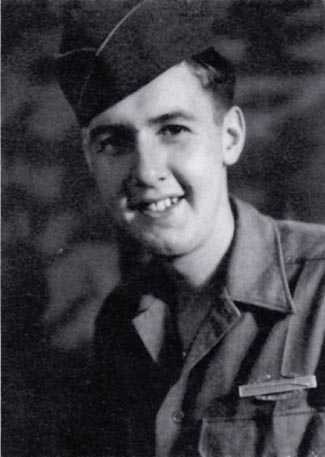
Under Fire

Under Fire

Leo W. LeFevre was a freshman engineering student at North Dakota Agricultural
College (NDAC) in 1941 when the Japanese bombed Pearl Harbor. He enrolled in
the College's ROTC Program in 1942 and received orders to report for active
duty upon completion of the Winter Quarter in 1943. From Fargo, LeFevre went
to Fort Snelling to Camp Joseph T. Robinson to Fort Benning to Fort Smith to
Stillwater, Oklahoma (for the Army Specialized Training Program, ASTP) to Camp
Maxey before being shipped out to England in 1944. LeFevre was wounded in the
shoulder as the American forces attacked the Germans near the Roer River Dams.
As he was being transported out the area, the first German bombs began falling
on the area--it was the beginning of the Battle of the Bulge. After three months
in the hospital for rehabilitation and rest, LeFevre returned to active duty
as a member of the army of occupation. He was discharged in 1946. Below is a
poem written by LeFevre expressing his thoughts of what it was like being under
enemy fire.
| Like wings of wind in the sky overhead, |
| In a feathery whisper marked flight, |
| Shells arch over to call for dead |
| From ranks of the living tonight. |
| Suspense grips the land till they pound far away, |
| Like the slam of a heavy door. |
| "Thank God they are ours", the fellows say |
| Of the reaper who's gone before. |
| But sounds of answering shells spread alarm, |
| Of a vengeance that will not be stayed. |
| There are places to hide from a bullet's harm, |
| But from shellfire we have no shade. |
| Our fears are confirmed by a whistle and crash, |
| With hardly a whistle at all. |
| Each man hits the ground lit by crimson flash. |
| Only those near a hole dare to crawl. |
| Though hair won't comb, set by helmet of steel, |
| I feel a scalp tingle creeping, |
| And wonder if face show how naked I feel |
| Lying more still than if sleeping. |
| The ground feels good as it presses my cheek |
| How I wish for a hole to hide. |
| You can't help cringing as close shells shriek |
| But it is not from these we need hide. |
| A guy seldom hears the one shell he fears, |
| The one that will snuff out his life, |
| For it does its job `ere the sound beats his ears, |
| Putting an end to his strife. |
| The good earth that holds us is seething and sore, |
| And it spews out splinters and rock |
| As it stops each shell's hissing flight with a roar, |
| And trembles with the shock. |
| The mind, outraged, cries, "Why am I here?" |
| As if in answer, comes the Order, "Move out." |
| Discipline reigns. There's no new depth of fear. |
| The command is passed with a shout. |
| Then we run, and fall and run again, |
| Like sheep going over a hill; |
| Check on equipment and buddies, and then |
| Duck as shrapnel sings shrill. |
| The scene is left to debris and the dead. |
| The tide of the battle moves on. |
| We try not to think of days ahead |
| And of comrades who are now gone. |
| We are like machines, parts of bigger machines. |
| Existing in action until fate stops our wheels; |
| Knowing full well what expendable means |
| From the way that being expendable feels. |
| We must carry on till our number comes up, |
| And maybe the lucky go first. |
| Even those who drink to the depth of life's cup |
| Pass on with unquenched thirst. |
| Bill LeFevre |
| A Co. 395 Inf. Reg. |
*The poem is written in four line stanzas.